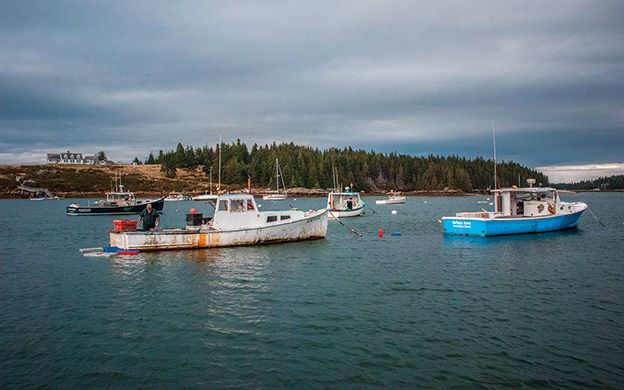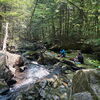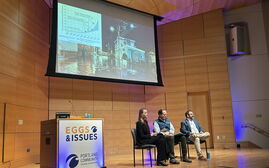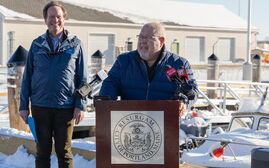Processing Your Payment
Please do not leave this page until complete. This can take a few moments.
- News
-
Editions
View Digital Editions
Biweekly Issues
- December 1, 2025
- Nov. 17, 2025
- November 03, 2025
- October 20, 2025
- October 6, 2025
- September 22, 2025
- + More
Special Editions
- Lists
- Viewpoints
-
Our Events
Event Info
Award Honorees
- Calendar
- Biz Marketplace
NOAA recommends Maine fisheries research projects for $1.5M in funding
 Photo / James McCarthy
Lobster boats in the harbor of Isle au Haut. Nearly 50% of the community's year-round residents make their living as lobstermen. The University of Maine has been recommended by the National Oceanic and Atmospheric Administration for a $275,308 grant to assess the potential for sustainability of fishing-dependent communities in coastal Maine in the face of environmental and socioeconomic change.
Photo / James McCarthy
Lobster boats in the harbor of Isle au Haut. Nearly 50% of the community's year-round residents make their living as lobstermen. The University of Maine has been recommended by the National Oceanic and Atmospheric Administration for a $275,308 grant to assess the potential for sustainability of fishing-dependent communities in coastal Maine in the face of environmental and socioeconomic change.
The National Oceanic and Atmospheric Administration has recommended over $1.5 million in Saltonstall-Kennedy Grant Program funding for six fisheries research projects in Maine.
The goal of the Saltonstall-Kennedy program is to fund projects that address the needs of fishing communities, optimize economic benefits by building and maintaining sustainable fisheries and increase other opportunities to keep working waterfronts viable.
The program has recommended the following projects for funding; final approval is pending:
- Downeast Institute for Applied Marine Research and Education, $278,000: Demonstrating aquaculture technologies designed to increase the supply, quality and diversification of domestic seafood: Field experiments with cultured arctic surf clams.
- Gulf of Maine Research Institute, $288,888: Addressing the issue of "Choke" species in a changing climate.
- Atlantic Offshore Lobstermen's Association Lobster, $141,092: Migration and growth: Continuation and expansion of 2015 tagging effort on Georges Bank and in the Gulf of Maine.
- Bigelow Laboratory for Ocean Sciences, $298,932: A 'Halo' for shellfish aquaculture: Discovering the phytoremediation potential of farmed kelp.
- University of Maine, $299,623: Evaluating the life history and stock structure of yellowfin tuna in the northwest Atlantic Ocean.
- University of Maine, $275,308: Assessing the potential for sustainability of fishing-dependent communities in coastal Maine in the face of environmental and socioeconomic change.
In a news release announcing the NOAA’s recommendations, U.S Rep. Chellie Pingree, D-Maine, characterized the projects as “key to the future of the Gulf of Maine and the thousands of Mainers who make their living from it.”
“Climate change and other factors are rapidly altering our oceans, the fisheries they support, and the communities that rely on them,” she said. “We need the best scientific information possible to respond to those changes, sustainably manage our resources, and find ways to move our coastal economy forward.”
Editor's note: This story has been updated to include Downeast Institute for Applied Marine Research and Education as one of the grant projects.
Mainebiz web partners
Related Content

The Giving Guide
The Giving Guide helps nonprofits have the opportunity to showcase and differentiate their organizations so that businesses better understand how they can contribute to a nonprofit’s mission and work.
Learn More
Work for ME
Work for ME is a workforce development tool to help Maine’s employers target Maine’s emerging workforce. Work for ME highlights each industry, its impact on Maine’s economy, the jobs available to entry-level workers, the training and education needed to get a career started.
Learn More
Groundbreaking Maine
Whether you’re a developer, financer, architect, or industry enthusiast, Groundbreaking Maine is crafted to be your go-to source for valuable insights in Maine’s real estate and construction community.
Learn more-
The Giving Guide
The Giving Guide helps nonprofits have the opportunity to showcase and differentiate their organizations so that businesses better understand how they can contribute to a nonprofit’s mission and work.
-
Work for ME
Work for ME is a workforce development tool to help Maine’s employers target Maine’s emerging workforce. Work for ME highlights each industry, its impact on Maine’s economy, the jobs available to entry-level workers, the training and education needed to get a career started.
-
Groundbreaking Maine
Whether you’re a developer, financer, architect, or industry enthusiast, Groundbreaking Maine is crafted to be your go-to source for valuable insights in Maine’s real estate and construction community.
ABOUT
NEW ENGLAND BUSINESS MEDIA SITES
No articles left
Get access now
In order to use this feature, we need some information from you. You can also login or register for a free account.
By clicking submit you are agreeing to our cookie usage and Privacy Policy
Already have an account? Login
Already have an account? Login
Want to create an account? Register
Get access now
In order to use this feature, we need some information from you. You can also login or register for a free account.
By clicking submit you are agreeing to our cookie usage and Privacy Policy
Already have an account? Login
Already have an account? Login
Want to create an account? Register










Comments